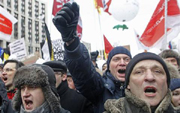VOA慢速英语2011-- 20 Years After the Soviet Union, Renewed Calls for Political Reform
时间:2018-11-27 作者:英语课 分类:2011年VOA慢速英语(十二)月
IN THE NEWS - 20 Years After the Soviet 1 Union, Renewed Calls for Political Reform
This is IN THE NEWS in VOA Special English.
December marks twenty years since the collapse 2 of the Soviet Union. Mikhail Gorbachev was the last Soviet leader. His reforms influenced the Soviet Union’s fall.
In nineteen eighty-five, Mr. Gorbachev was elected General Secretary of the Communist Party of the Soviet Union. He was fifty-four years old - the youngest member of the ruling committee, called the Politburo, that voted him into power.
For the next six years, Mr. Gorbachev worked toward a series of reforms that radically 3 changed the Soviet Union. His reforms included loosening press restrictions 4 and releasing political prisoners and dissidents from jail and exile within the country.
One institution Mr. Gorbachev failed to reform, however, was the Soviet Communist Party. And it was people within the party, along with the leadership of the military and the KGB, the Soviet intelligence service, that attempted a coup 5 against Mr. Gorbachev in nineteen ninety-one.
The coup failed. And the Soviet Union collapsed 6 four months later. On December twenty-fifth, nineteen ninety-one Mr. Gorbachev resigned as Soviet president.

Demonstrators in Moscow protest against suspected cheating in Russia's parliamentary elections
Russia has made major economic progress since the collapse of the Soviet Union. Incomes have increased sharply. But twenty years after demonstrations 7 against communism, Russians are again taking to the streets. This time the demonstrations are not for capitalist revolution, but for democratic reform.
Masha Lipman marched in the nineteen ninety-one protests. She is now an expert at Carnegie Moscow Center.
MASHA LIPMAN: “It’s very symbolic 8 that we are having this public activism on the rise exactly twenty years after the collapse of the USSR.”
In nineteen ninety-one the major concern was economic. Vladimir Ryzhkov, at the time, was trying to run a provincial 9 city.
VLADIMIR RYZHKOV: “The economy was destroyed. Nothing worked. I remember we had meetings every day to discuss very simple questions: Where could we get coal? Where could we get kerosene 10? We even had a meeting to figure out how to assure the supply of bread and milk for the city.”
In the twenty years since the Soviet collapse, Russians’ real incomes have increased. But democratic institutions have not kept up.
Public opinion expert Lev Gudkov says institutions did not evolve with Russia’s consumer economy.
LEV GUDKOV: “Government is still vertical 11, it is not controlled by the society and in essence, despite all the changes, is built the same way it was built in the Soviet Union. And its base is mainly political police, criminal police, there is no independent court, prosecution 12 and system of education.”
Next March, Russian citizens will elect a new president to replace Dmitry Medvedev. Former president and current prime minister, Vladimir Putin is expected to win. Russian President Medvedev is stepping down to make way for Mr. Putin’s candidacy.
Suspected cheating in the December fourth Russian parliamentary elections has caused the largest protests since the collapse of the Soviet Union. Activists 13 say Mr. Putin’s United Russia party illegally won a narrow majority. They want to throw out the results and hold a new vote.
And that's IN THE NEWS in VOA Special English written by Brianna Blake. I'm Mario Ritter.
___
Contributing: Andre de Nesnera, James Brooke
- Zhukov was a marshal of the former Soviet Union.朱可夫是前苏联的一位元帅。
- Germany began to attack the Soviet Union in 1941.德国在1941年开始进攻苏联。
- The country's economy is on the verge of collapse.国家的经济已到了崩溃的边缘。
- The engineer made a complete diagnosis of the bridge's collapse.工程师对桥的倒塌做了一次彻底的调查分析。
- I think we may have to rethink our policies fairly radically. 我认为我们可能要对我们的政策进行根本的反思。
- The health service must be radically reformed. 公共医疗卫生服务必须进行彻底改革。
- I found the restrictions irksome. 我对那些限制感到很烦。
- a snaggle of restrictions 杂乱无章的种种限制
- The monarch was ousted by a military coup.那君主被军事政变者废黜了。
- That government was overthrown in a military coup three years ago.那个政府在3年前的军事政变中被推翻。
- Jack collapsed in agony on the floor. 杰克十分痛苦地瘫倒在地板上。
- The roof collapsed under the weight of snow. 房顶在雪的重压下突然坍塌下来。
- Lectures will be interspersed with practical demonstrations. 讲课中将不时插入实际示范。
- The new military government has banned strikes and demonstrations. 新的军人政府禁止罢工和示威活动。
- It is symbolic of the fighting spirit of modern womanhood.它象征着现代妇女的战斗精神。
- The Christian ceremony of baptism is a symbolic act.基督教的洗礼仪式是一种象征性的做法。
- City dwellers think country folk have provincial attitudes.城里人以为乡下人思想迂腐。
- Two leading cadres came down from the provincial capital yesterday.昨天从省里下来了两位领导干部。
- It is like putting out a fire with kerosene.这就像用煤油灭火。
- Instead of electricity,there were kerosene lanterns.没有电,有煤油灯。
- The northern side of the mountain is almost vertical.这座山的北坡几乎是垂直的。
- Vertical air motions are not measured by this system.垂直气流的运动不用这种系统来测量。
- The Smiths brought a prosecution against the organizers.史密斯家对组织者们提出起诉。
- He attempts to rebut the assertion made by the prosecution witness.他试图反驳原告方证人所作的断言。